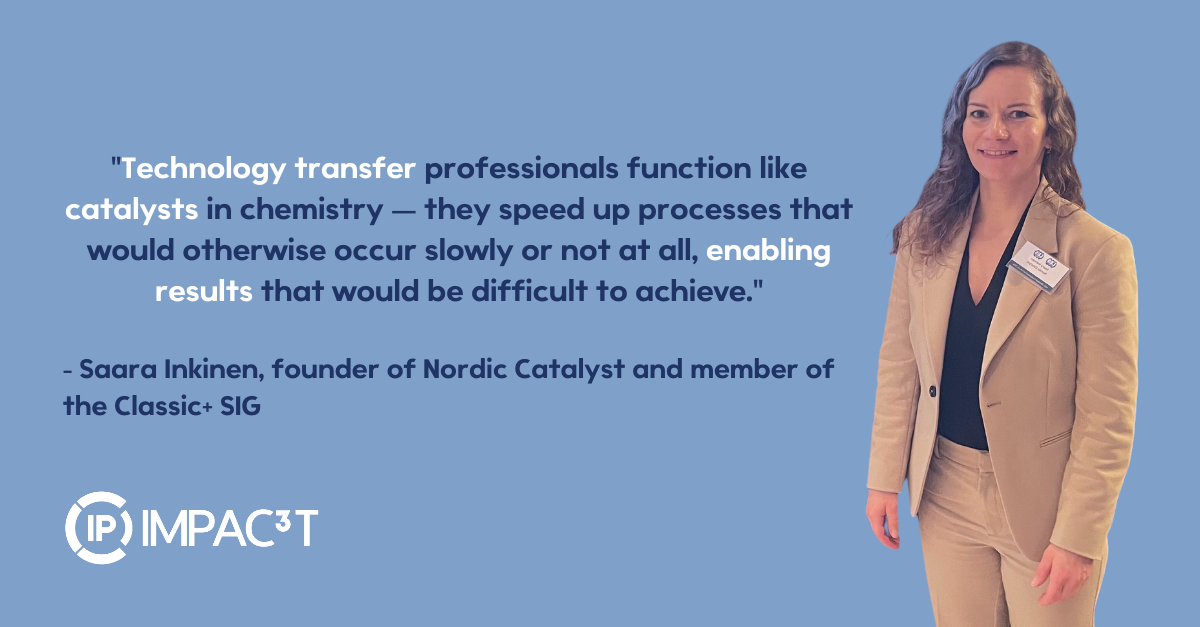The Special Interest Groups (SIGs) form the core of IMPAC3T-IP activities . For each licensing scenario addressed by the action —Classical Plus, Crisis, and Co-Creation—we have established a dedicated SIG. These groups bring together licensing experts from a wide range of backgrounds, including industry, academia, government, and society.
Today, we interview Saara Inkinen, a member of the Classical Plus SIG. She is an expert in Technology Transfer (TT) and innovation management, with a strong background in chemical and biochemical engineering. After studying in Finland and the UK, she pursued a career in R&D, completing her doctoral thesis in polymer technology in 2011. Afterwards, Saara specialised in Technology Transfer, gaining her first experience in the field in the US in 2012. This led her to found her own company, Nordic Catalyst. She is also deeply involved in international initiatives, currently serving as Co-Chair of the Technology Transfer Committee at the Licensing Executives Society International (LESI). Saara has been recently recognised as one of the Voices of a New Era of Leaders by the female factor.
Why is the role of a TT professional important in today’s innovation ecosystem?
Technology transfer (TT) professionals are increasingly important intermediaries in today’s fast-paced innovation ecosystem. Although the field of technology transfer is multifaceted, in the context of IMPAC3T-IP, it primarily involves the transfer of technology and knowledge from academia to companies. The specific roles and responsibilities of TT professionals vary depending on their specialisation and the type of organisation they represent. The TT community includes patent attorneys, legal specialists, commercialisation experts, technology brokers, and external service providers, among others.
Despite their different roles, all TT professionals share the common goal of accelerating the transition of ideas, concepts, and inventions from the research phase to the implementation or commercialisation phase. In this sense, TT professionals function like catalysts in chemistry — they speed up processes that would otherwise occur slowly or not at all, and they can be reused for new initiatives. This is how I see the role of TT professionals today: enabling results that would otherwise be difficult to achieve. However, it is important to remember that the innovation ecosystem is constantly evolving, and so will the role of TT professionals as part of it.
What are some of the most rewarding aspects of your job as a TT professional?
What ultimately motivates me in my job is the same as it was in the beginning of my career: the opportunity to contribute to creating a positive impact on society and the environment. Although the journey from a research idea to a marketable product or social impact can be long, the stage where TT and innovation professionals are involved plays a critical role in this transition. As a consultant and trainer, I often work with diverse teams of researchers and highly skilled professionals at the most exciting steps of the process.
In summary, successful impact creation results from seamless collaboration between different types of experts and organisations. These interactions and the resulting shared successes, both big and small, are the most rewarding aspects of my job.
What has been your role as a member of the Classic+ SIG?
The Classic+ SIG focuses on licensing beyond the traditional industrial rights such as patents or trademarks. Our goal is to facilitate the creation of modern bundles of rights, particularly in the rapidly evolving landscape of digital technologies such as IoT, AI and machine learning.
While our work is still in its early stages, we have been gathering best practices and case studies for different scenarios. I look forward to continuing our collaboration and discussing related topics and future visions at our next meeting.
What are the current needs and challenges faced by IP professionals, especially in the context of sustainable licensing and knowledge transfer?
Sustainable IP licensing is part of a broader shift toward a holistic perspective on technology and knowledge transfer. Sustainability has long been a key focus area in R&D related to, for example, green technologies and circular economy. In the future, IP exploitation will become even more collaborative as sustainable open innovation practices are implemented more extensively. This means that sustainability will be an essential component in the IP exploitation and knowledge exchange strategies, impacting not only the licensing of patents, but the exploitation of all IP assets, as well as various business-related factors such as branding and marketing.
Currently, many companies and research organisations are underutilising their IP due to a lack of readily available and user-friendly tools that support valorisation activities from a sustainability perspective. Additionally, sustainability from social and societal viewpoints should be systematically considered. IMPAC3T-IP addresses these challenges by developing a toolbox and training academy for stakeholders in the innovation ecosystem.
In conclusion, Saara Inkinen’s insights into the role of technology transfer (TT) professionals underscore their importance as catalysts in the innovation ecosystem, facilitating the transition of ideas from research to market. With the crucial help of the SIGs, IMPAC3T-IP is developing a comprehensive toolbox and training program designed to enhance licensing practices across the three scenarios. The toolbox, tailored specifically for licensing professionals, will support a wide range of IP assets and provide intervention points throughout the innovation process.
Through the collaborative efforts of experts like Saara and actions like IMPAC3T-IP, the future of IP exploitation will increasingly focus on sustainability and open innovation, fostering a holistic approach to technology and knowledge transfer.
Subscribe to our newsletter to receive the report about the SIG results.
